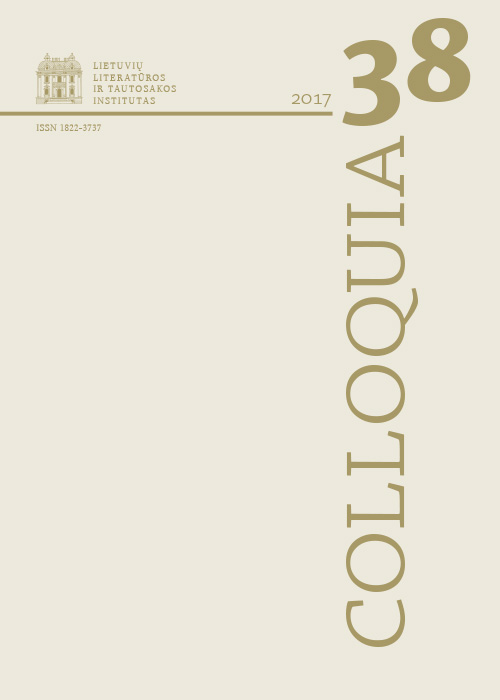Literatūrinės baltistikos samprata: įvairios versijos
Santrauka
Straipsnį sudaro dvi dalys. Pirmojoje analizuojama tradicinė literatūrinės baltistikos samprata, grįsta etnolingvistinės giminystės kriterijumi, kuris suponuoja būtiną šiam mokslui komparatyvinį matmenį ir įkomponuoja jį į baltų filologijos disciplinos visumą. Ši samprata apima: 1) tradicinius lyginamuosius abiejų báltų tautų, lietuvių ir latvių, literatūrų tyrimus – tiek genetinius, tiek tipologinius; 2) daugiausia lingvopoetine bei mitopoetine metodologinėmis prieigomis besiremiančią poetinę baltistiką, kuri labiausiai orientuota į įvairiuose literatūros lygmenyse, ypač kalbiniame, pasireiškiančių bendrabaltiškumo apraiškų analizę. Antrojoje dalyje analizuojama tokia literatūrinės baltistikos samprata, kurią apibūdintume kaip funkcinę. Ją labiausiai įtvirtina lietuvių ir latvių literatūrų studijavimo bei sklaidos praktika užsienyje. Ši samprata apima: 1) tendenciją lyginamąją ar tradicinę literatūrinę lituanistiką bei latvistiką kontekstualiai traktuoti kaip baltistiką (ši tendencija ryškiausia už Lietuvos ir Latvijos ribų dirbančių įvairių šalių mokslininkų darbuose); 2) tendenciją literatūrinę baltistiką kokiais nors būdais susieti (ar net „sulieti“) su literatūrologine Baltijos studijų (angl. Baltic Studies) kryptimi.
Atsisiuntimai
Skaitomiausi šio autoriaus(ų) straipsniai
- Vigmantas Butkus, Senovės Lietuvos paveikslas XX a. I pusės latvių literatūroje , Colloquia: T 51 (2023): Colloquia
- Vigmantas Butkus, Rašytojų kuriamas istorinės atminties paveikslas: Saulės mūšis latvių literatūroje , Colloquia: T 54 (2024): Colloquia
- Vigmantas Butkus, Ilgas Alfonso Maldonio ir Dainos Avuotinios dialogas: kalbasi rašytojai – kalbasi literatūros , Colloquia: T 50 (2022): Colloquia
- Vigmantas Butkus , Šiek tiek romantiškai apie latvių (neo)romantizmą , Colloquia: T 43 (2019)
- Vigmantas Butkus, Literatūrinė XX a. totalitarizmo ir XXI a. (e)migracijos vaizdinių galerija , Colloquia: T 47 (2021)
